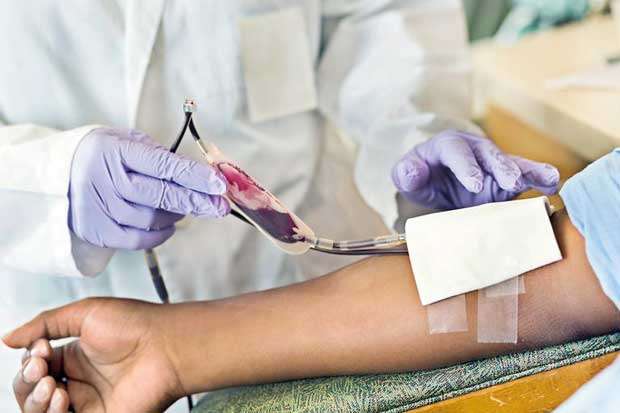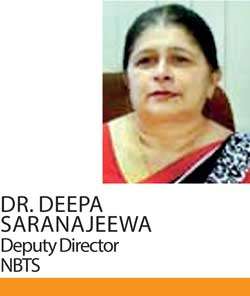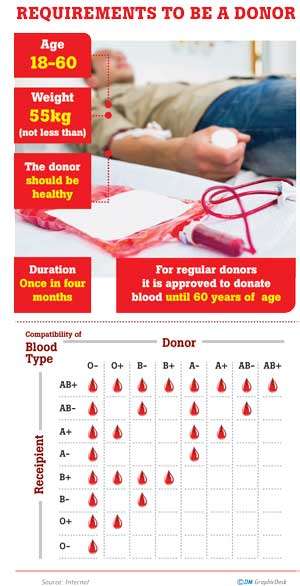Reply To:
Name - Reply Comment
Last Updated : 2024-04-25 00:00:00

 Blood keeps us alive. Without blood survival is impossible and the only way we could get blood is through another human being. Although the practice of donating blood has existed for decades, the need for safe and quality blood still exists. The National Blood Transfusion Service (NBTS) located at Narahenpita was launched as a special campaign under the purview of the Ministry of Health. The need for donor blood was felt during the assassination of late Prime Minister S.W.R.D Bandaranaike and at the time the blood bank was a single room located in the heart of Colombo.
Blood keeps us alive. Without blood survival is impossible and the only way we could get blood is through another human being. Although the practice of donating blood has existed for decades, the need for safe and quality blood still exists. The National Blood Transfusion Service (NBTS) located at Narahenpita was launched as a special campaign under the purview of the Ministry of Health. The need for donor blood was felt during the assassination of late Prime Minister S.W.R.D Bandaranaike and at the time the blood bank was a single room located in the heart of Colombo.
Fifty nine years later the NBTS continues its mission as the centrally coordinated blood transfusion centre. With over 90 hospital based blood banks affiliated to 70 cluster centres, the NBTS invites more donors to engage in this
humanitarian cause. In view of World Blood Donor Day (WBDD) held yesterday (June 14) the NBTS organised events to appreciate donors and organisers. Speaking to Mirror Health Capsule, NBTS Deputy Director Dr. Deepa Saranajeewa highlighted the significance of WBDD, the screening process and the importance of donating blood.
Significance of WBDD
World Blood Donor Day is one of the major global events hosted by the World Health Organisation apart from other seven global days they celebrate. “They have declared eight events including WBDD which we celebrate annually on June14th. This day also marks the birthday of Karl Landsteiner who founded the ABO blood grouping system,” said Dr. Saranajeewa. “This day has been honoured since 2004 and global celebrations take place in some country each year. Sri Lanka hosted the global event back in 2014. On this day the authorities appreciate and thank the people who donate blood to save the lives of others. It also aims to raise awareness among people as to how they could contribute in saving a life by donating this valuable gift. This year’s theme- ‘Be there for someone else. Give blood.
Share life’ -gives the idea that you are always there for someone else. At the same time you are encouraging people to help one another and give a positive message to the community to unite in the cause to save lives. Actually not all countries boasting of good health systems could engage in voluntary, non-remunerated blood donations. But we are very proud that Sri Lanka stands among the 60 countries that engage in such donations,” Dr. Saranajeewa said.
Blood that is donated should be safe and meet quality standards since there is a high risk of transmitting diseases. In terms of donations last year, the NBTS collected 424,000 units of whole blood. “In some other countries there are donors who are paid, but here blood donation is100% voluntary. The NBTS of any country has to make available sufficient, safe and quality blood supply to be used as and when required. At our national blood centre we are always maintaining 2000-3000 stocks of blood samples in all blood groups,” she added.
Procedure to donate 
In Sri Lanka, the NBTS is the sole agent for the Ministry of Health in voluntary blood donation and they also maintain the national blood centre here in Narahenpita along with another regional blood centre in Kamburugamuwa, Matara. Speaking further Dr. Saranajeewa said that apart from that they have disseminated their services through cluster centres. “This means that this centre is the teaching or the general hospital where there is a consultant transfusion physician. Under that consultant there are other base hospitals to that particular cluster centre. They conduct their own blood donation campaigns to accommodate the requirements of all hospitals in that cluster. NBTS Narahenpita is the cluster centre for Colombo and we provide blood to all teaching hospitals around in addition to the Army Hospital, KDU Hospital and the Neville Fernando Hospital along with all private hospitals. The requirement for a day lies between 300-330 whole blood units which are required for emergencies, therapeutic and surgical procedures, maternal care, paediatric patients and even the cancer hospital.
In all those blood samples the main components are platelets which are the by-product. We do a processing out of the whole blood units where we prepare red blood cells, platelets, plasma and cryoprecipitate. This is done in the component laboratory. Apart from that, before transfusing this product to the patient we do a Transfusion Transmitted Infection (TTI) screening. We screen the donors before collecting blood, but sometimes they may not understand what we ask for or they may conceal information and in order to avoid the consequences we conduct the second screening as well. We screen the blood for HIV/AIDS, hepatitis B and C, malaria and syphilis,” she said.
In the past, only cross matches were done. But today, in Sri Lanka, we also have gone in to automation and State of Art Technologies. Traditionally blood banks were involved in collection, processing and storage. But now we have stepped into cellular therapies such as bone marrow and stem cell transplantation, cord blood banking and organ transplantation and sample archiving. At National Blood Center , there are specified laboratories in Transfusion Medicine to help clinicians to find the best option to trat their patients. For example, National Reference laboratory at NBC helps clinicians to identify the proper red cell to be transfused to the patients with antibodies against red cells after a previous transfusion or pregnancy. HLA Laboratory (Human Leukocute Antigen) does the tissue typing for organ and bone marrow transplantation . Transfusion Medicine also performs therapeutic apheresis procedures where we do separation of blood in to components, removal of one component and return of the remainder to treat patients with neurologic, kidney and blood diseases.
Another procedure is Platelet-Rich Plasma (PRP) treatments which are mainly conducted on dermatological and orthopaedic patients.
Eligibility criteria
Not everyone can donate blood. The following basic requirements have to be fulfilled before a donation is done ;
Age : between 18 – 55 (a healthy, regular donor can donate until 60 years of age)
Weight : not less than 50kg
Haemoglobin : not less than 12 g/dL
“In addition to that, donors with non-communicable diseases such as diabetes, pressure cannot donate blood,” Dr. Deepa added. “Those with a history of having infectious diseases such as tuberculosis, syphilis, malaria and hepatitis too cannot donate blood. If a donor has travelled abroad, they have to wait for three months before donating blood. Another aspect we focus on is the aftercare of donors once they have donated blood. We have a donor care programme where they go through a biochemistry screening and are then able to donate blood every four months. Apheresis donors on the other hand donate platelets while others donate whole blood. They can donate platelets once in two weeks because platelets have a short life span of five days. Sometimes donors, in-house donors- walk-in and donate blood at our cluster centres and we also obtain blood from mobile donations organized by individual groups,”she said.
“Before a person donates blood he or she should have a good meal and sleep for six hours,” warns Dr. Saranajeewa. “It is good if they are not intoxicated as well. After donating blood, one shouldn’t drive. They should have adequate rest,” she said. Speaking further Dr. Saranajeewa expressed her concerns about the reduction in donations during certain seasons. “During the festive season there is less number of mobile donations taking place and during the rainy season these are usually cancelled. We however maintain a registry and in case of an emergency we call the donors and request for a donation,”the doctor added.
The main event in Sri Lanka recognized and appreciated 600 blood donors and 400 organisers who made the event a success. If a problem exists the public health inspectors (PHIs) are informed. In her concluding remarks Dr. Deepa said that people should be aware of these habits which are common among the older generation. “We need people to support us as we have a mission to collect quality blood and save as a many life as possible. The younger generation should start donating blood and make a conscious effort to avoid unhealthy practices such as smoking and drinking,”she said.

Add comment
Comments will be edited (grammar, spelling and slang) and authorized at the discretion of Daily Mirror online. The website also has the right not to publish selected comments.
Reply To:
Name - Reply Comment
US authorities are currently reviewing the manifest of every cargo aboard MV
On March 26, a couple arriving from Thailand was arrested with 88 live animal
According to villagers from Naula-Moragolla out of 105 families 80 can afford
Is the situation in Sri Lanka so grim that locals harbour hope that they coul